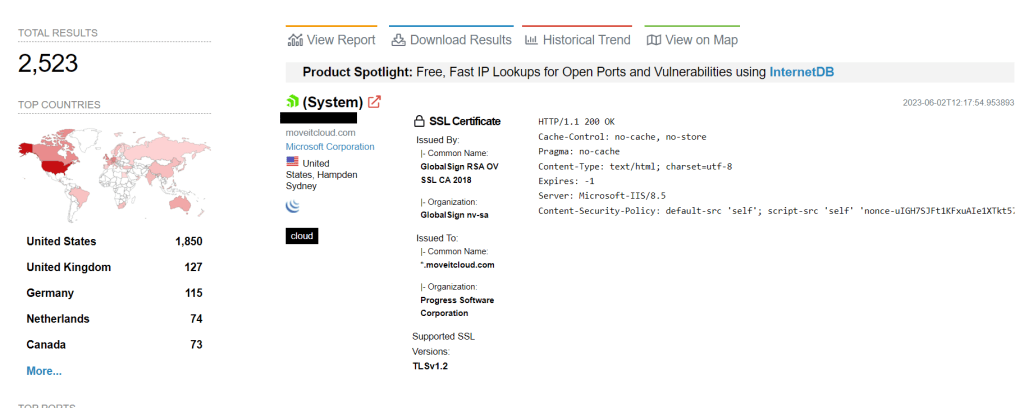Microsoft attributes the recent campaign exploiting a zero-day in the MOVEit Transfer platform to the Clop ransomware gang.
The Clop ransomware gang (aka Lace Tempest) is credited by Microsoft for the recent campaign that exploits a zero-day vulnerability, tracked as CVE-2023-34362, in the MOVEit Transfer platform.
Microsoft is attributing attacks exploiting the CVE-2023-34362 MOVEit Transfer 0-day vulnerability to Lace Tempest, known for ransomware operations & running the Clop extortion site. The threat actor has used similar vulnerabilities in the past to steal data & extort victims. pic.twitter.com/q73WtGru7j
— Microsoft Threat Intelligence (@MsftSecIntel) June 5, 2023
The Microsoft Threat Intelligence team pointed out that the Lace Tempest group has already used similar vulnerabilities in the past to steal data from organizations worldwide and extort them.
MOVEit Transfer is a managed file transfer that is used by enterprises to securely transfer files using SFTP, SCP, and HTTP-based uploads.
The vulnerability is a SQL injection vulnerability, it an be exploited by an unauthenticated attacker to gain unauthorized access to MOVEit Transfer’s database.
“a SQL injection vulnerability has been found in the MOVEit Transfer web application that could allow an un-authenticated attacker to gain unauthorized access to MOVEit Transfer’s database.” reads the advisory published by the company. “Depending on the database engine being used (MySQL, Microsoft SQL Server, or Azure SQL), an attacker may be able to infer information about the structure and contents of the database in addition to executing SQL statements that alter or delete database elements.”
The vulnerability affects all MOVEit Transfer versions, it doesn’t affect the cloud version of the product. The company also shared Indicators of Compromise (IoCs) for this attack and urges customers that notice any of the indicators to immediately contact its security and IT teams.
Multiple security firms are warning that the vulnerability has been actively exploited in the wild.
GreyNoise researchers have observed scanning activity for the login page of MOVEit Transfer located at /human.aspx as early as March 3rd, 2023, for this reason, the experts recommend Progress customers to review potentially malicious activity that was recorded in the last 90 days.
“While we have not observed activity directly related to exploitation, all of the 5 IPs we have observed attempting to discover the location of MOVEit installations were marked as “Malicious” by GreyNoise for prior activities.” reads the alert published by GreyNoise. “The primary artifact, observed through publicly available information, is the presence of a webshell named human2.aspx. This is a post-exploitation file artifact that is written to the filesystem by a malicious actor allowing them to execute arbitrary commands. GreyNoise is observing scanning activity looking to identify the presence of the human2.aspx webshell dropped as part of the post-exploitation activity.”
By May 31, Rapid7 experts discovered approximately 2,500 instances of MOVEit Transfer publicly accessible on the internet, with a significant portion located in the United States.

“Our teams have so far observed the same webshell name in multiple customer environments, which may indicate automated exploitation.” reported Rapid7.
Microsoft researchers confirmed that the attackers exploit the vulnerability to deploy a web shell with data exfiltration capabilities. Threat actors exploit the CVE-2023-34362 to authenticate as a user with the highest privileges to exfiltrate files.
The IT giant urges organizations potentially impacted by the CVE-2023-34362 flaw to apply security patches and perform mitigation actions shared by the vendor.
Microsoft strongly urges organizations affected by the CVE-2023-34362 MOVEit Transfer vulnerability to apply security patches and perform mitigation actions provided by Progress in their security advisory. https://t.co/Zo5KuQliOq
— Microsoft Threat Intelligence (@MsftSecIntel) June 5, 2023
Follow me on Twitter: @securityaffairs and Facebook and Mastodon
(SecurityAffairs – hacking, clop ransomware)
The post Microsoft blames Clop ransomware gang for ‘MOVEit Transfer’ attacks appeared first on Security Affairs.

